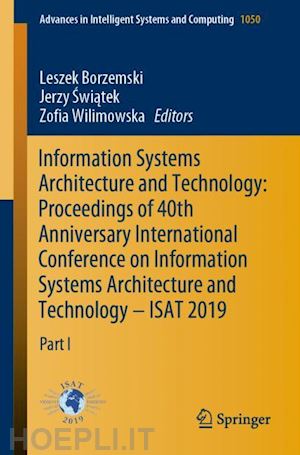
Questo prodotto usufruisce delle SPEDIZIONI GRATIS
selezionando l'opzione Corriere Veloce in fase di ordine.
Pagabile anche con Carta della cultura giovani e del merito, 18App Bonus Cultura e Carta del Docente
This three-volume book highlights significant advances in the development of new information systems technologies and architectures. Further, it helps readers solve specific research and analytical problems and glean useful knowledge and business value from data. Each chapter provides an analysis of a specific technical problem, followed by a numerical analysis, simulation, and implementation of the solution to the real-world problem.
Managing an organization, especially in today’s rapidly changing environment, is a highly complex process. Increased competition in the marketplace, especially as a result of the massive and successful entry of foreign businesses into domestic markets, changes in consumer behaviour, and broader access to new technologies and information, calls for organisational restructuring and the introduction and modification of management methods using the latest scientific advances. This situation has prompted various decision-making bodies to introduce computer modelling of organization management systems.This book presents the peer-reviewed proceedings of the 40th Anniversary International Conference “Information Systems Architecture and Technology” (ISAT), held on September 15–17, 2019, in Wroclaw, Poland. The conference was organised by the Computer Science Department, Faculty of Computer Science and Management, Wroclaw University of Sciences and Technology, and University of Applied Sciences in Nysa, Poland. The papers have been grouped into three major sections:
Part I—discusses topics including, but not limited to, artificial intelligence methods, knowledge discovery and data mining, big data, knowledge-based management, Internet of Things, cloud computing and high-performance computing, distributed computer systems, content delivery networks, and service-oriented computing.
Part II—addresses various topics, such as system modelling for control, recognition and decision support, mathematical modelling incomputer system design, service-oriented systems, and cloud computing, and complex process modelling.
Part III—focuses on a number of themes, like knowledge-based management, modelling of financial and investment decisions, modelling of managerial decisions, production systems management, and maintenance, risk management, small business management, and theories and models of innovation.











Il sito utilizza cookie ed altri strumenti di tracciamento che raccolgono informazioni dal dispositivo dell’utente. Oltre ai cookie tecnici ed analitici aggregati, strettamente necessari per il funzionamento di questo sito web, previo consenso dell’utente possono essere installati cookie di profilazione e marketing e cookie dei social media. Cliccando su “Accetto tutti i cookie” saranno attivate tutte le categorie di cookie. Per accettare solo deterninate categorie di cookie, cliccare invece su “Impostazioni cookie”. Chiudendo il banner o continuando a navigare saranno installati solo cookie tecnici. Per maggiori dettagli, consultare la Cookie Policy.